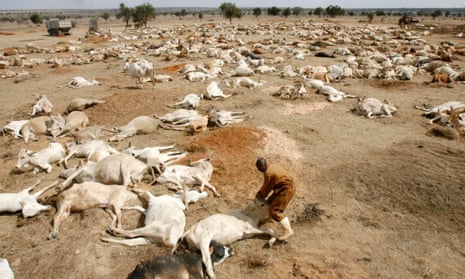The arid and semi-arid lands (ASAL) of Kenya are among the poorest and most vulnerable regions of the world. In Kenya’s ASALs, drought is the most pervasive hazard, encountered by households on a widespread level. More than three million pastoralist households are regularly hit by increasingly severe droughts, costing the economy an estimated $12.1bn between 2008 and 2011. For livelihoods that rely mainly on livestock, the high livestock mortality rate caused by drought has devastating effects, rendering these pastoralists among the most vulnerable populations in Kenya. As the impacts of climate change unfold, the link between drought risk, vulnerability and poverty becomes significantly stronger.
Over the past several years, the International Livestock Research Institute (ILRI), in collaboration with Cornell University and technical partners, has pursued a research program aimed at designing, developing and implementing insurance products to protect livestock keepers from drought-related asset losses. Using satellite imagery to assess the amount of forage available, Index-Based Livestock Insurance (IBLI) provides insured pastoralists with a pay-out in times of drought based on predicted rather than actual livestock deaths.
In order to launch IBLI as a commercial product, ILRI and Takaful Insurance of Africa came together in August 2013 to offer a sharia-compliant version of IBLI in Wajir County with plans of expansion into other areas of northern Kenya later this year. As a sharia compliant product, Takaful does not go against the teachings of Islam and is guided by the principles of improved welfare for all. For example, it offers mutual or “community insurance”, whereby the insurer charges a set fee, rather than applying interest, which in sharia-law can be seen as a form of gambling.
The CEO of Takaful Insurance of Africa, Hassan Bashir, was born into a cattle-herding Somali family, and as Kenya’s first sharia-compliant insurance company, he wanted to solve his community’s biggest problem – the loss of livestock due to drought.
Takaful requires that those who need protection participate in a risk pooling scheme. Fund participants are grouped into geographically defined areas that have a set contribution based on local pasture conditions and they receive an indemnity when predicted livestock mortality from drought rises above the trigger level.
One of the biggest challenges facing Index Based Livestock Takaful (IBLT) is consumer education to catalyse demand. The communities in the target areas have low written literacy levels, radio coverage is limited to near town centres, and mobile phone coverage can be sporadic. Finally, as a pastoral population, worse weather means that more members of the community are trekking with their animals to find better pasture, which impacts who is available to purchase.
This situation is further compounded by the fact that these communities have had little or no prior experience with insurance. It takes them time to trust the product and overcome their preconceived notions of its compliance with sharia law. Further, due to low levels of liquidity, pastoralists must often consider selling an animal in order to pay for the premium. As a result, many pastoralists buy small, less expensive contracts for “shoats” (sheeps & goats) to test the product before they pay the more expensive premiums for cattle and camels.
Nevertheless, the scheme has had its successes. In March 2014, all 101 policyholders received a payout for a low level of drought in the area and sales between August/September 2013 and January/February 2014 grew by 138% with the expense ratio to Takaful Insurance decreasing by 100%.
In order for IBLT to reach scale and commercial sustainability, plans are underway to expand across the Greater Horn of Africa starting with Somalia, as Takaful Insurance has recently opened offices in Mogadishu and Hargeisa. Critical distribution infrastructure, such as mobile phone coverage and mobile money, as well as FM radio coverage is almost complete in areas of Takaful Insurance’s operation. So far, the Index-Based Livestock Insurance program has been linked to a 50% drop in ‘distress’ sales of livestock to raise cash in times of drought, a 33% reduced likelihood of having to eat significantly smaller meals and a 33% reduction in dependence on food aid.
Leading research body CGIAR recently announced that it will dedicate at least 60% of its one $1bn annual budget to reaching more vulnerable people with climate-smart initiatives such as Index-Based Livestock Insurance. The impacts seen in Kenya could be scaled up, but given the infrastructural and other challenges of east Africa’s drylands, it is not yet clear whether an IBLI product can be entirely commercially viable without subsidy support. Despite this, and even though IBLI does not offer complete protection against herd loss, it is a promising option for addressing poverty traps that arise from catastrophic drought risk. Uptake has had a range of benefits for those insured, including improved wellbeing and a reduction in drastic coping strategies when drought strikes.
Bryn Davies is the market and capacity development manager at the International Livestock Research Institute. Andrew Mude is a principal economist at the International Livestock Research Institute
Read more like this:
- Using mobile phones to better understand refugees’ food needs
- Food and drinks companies respond to consumer pressure on climate change
- Bristol to provide urban farming inspiration as EU Green Capital
- Advertisement feature: The importance of sustainable food in Ireland - video
The food hub is funded by The Irish Food Board. All content is editorially independent except for pieces labelled advertisement feature. Find out more here.
Join the community of sustainability professionals and experts. Become a GSB member to get more stories like this direct to your inbox

Comments (…)
Sign in or create your Guardian account to join the discussion